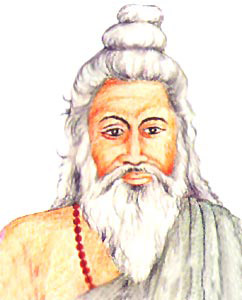 Vasistha, according to Hindu Mythology, was one of the seven great Rishis or the saptarshis of the seventh Manwantara. Legends say that the great saint, Vashishta was born as the result of Lord Brahma`s will power. He was one of the greatest ascetics of his time, who dedicated his entire life for the welfare of the world. Vasistha was also the Rajguru or the Rajpurohit of the solar dynasty. Kamdhenu, the divine cow and her daughter Nandini was in possession of Vasistha. The cow Kamdhenu and Nandini could grant everything desired by an individual.
Vasistha, according to Hindu Mythology, was one of the seven great Rishis or the saptarshis of the seventh Manwantara. Legends say that the great saint, Vashishta was born as the result of Lord Brahma`s will power. He was one of the greatest ascetics of his time, who dedicated his entire life for the welfare of the world. Vasistha was also the Rajguru or the Rajpurohit of the solar dynasty. Kamdhenu, the divine cow and her daughter Nandini was in possession of Vasistha. The cow Kamdhenu and Nandini could grant everything desired by an individual.
Sage Vasistha is known as the chief author of Mandala 7 of the Rig Veda. In many of the verses of Rig Veda Vasistha and his wife Arundhati have been glorified. It is believed that Ursa Major is Vasistha and the small star beside it Alcor is considered to be his wife Arundhati.
The unique characteristic of saint Vashishta was that he was never a hermit, like most of the other saints. The only time he had his hermitage, was when he used to go to the banks of the River Saraswati. He had the habit of imparting Vedic knowledge to his numerous disciples on the banks of the River Saraswati and there was a regular performance of several holy sacrifices for the good of the world which were held in the hermitage.
One of the greatest strengths of Vashishta was the merit earned by these performances of tapasya. He was a learned man and he always loved peace. He also became successful in conquering his desire and anger and he was the priest to Dasaratha and also Lord Rama.
One of the legends says that King Dillepa was the king of the Raghuvamsha Dynasty and he had a wife named Sudkashina, but they had no children. So they approached Sage Vasistha and he advised that they should serve Nandini, the child of Kamdhenu for some days and if Nandini was pleased with their service she would grant them a child. As a result King Dillepa served Nandini selflessly for twenty one days and she gifted them with a child.
Vashishta also wrote a pamphlet named as the `Vasishta Smriti` and the pamphlet was written on dharma righteousness. He also composed another treatise named the `Vashishta Ramayana`. Vashishta had the belief that the divine and individual efforts were very necessary for achieving anything in this world. According to him, the habit of laziness is actually a disease that is responsible to bring unhappiness in a man`s life.
The remains of the Vasistha Ashram are till present in Ayodhya. Brahmarishi Vasistha had an ashram spread over a land of 40 acres. During that time Ishvaku was the ruler of Ayodhya and legend says that Ishvaku had requested Vasistha to do something which would bring adequate water to the kingdom of Ayodhya. As a result Vasistha made River Saryu flow from the well in Ayodhya. Till today the site of River Sarayu is considered to have a lot of spiritual energy.









